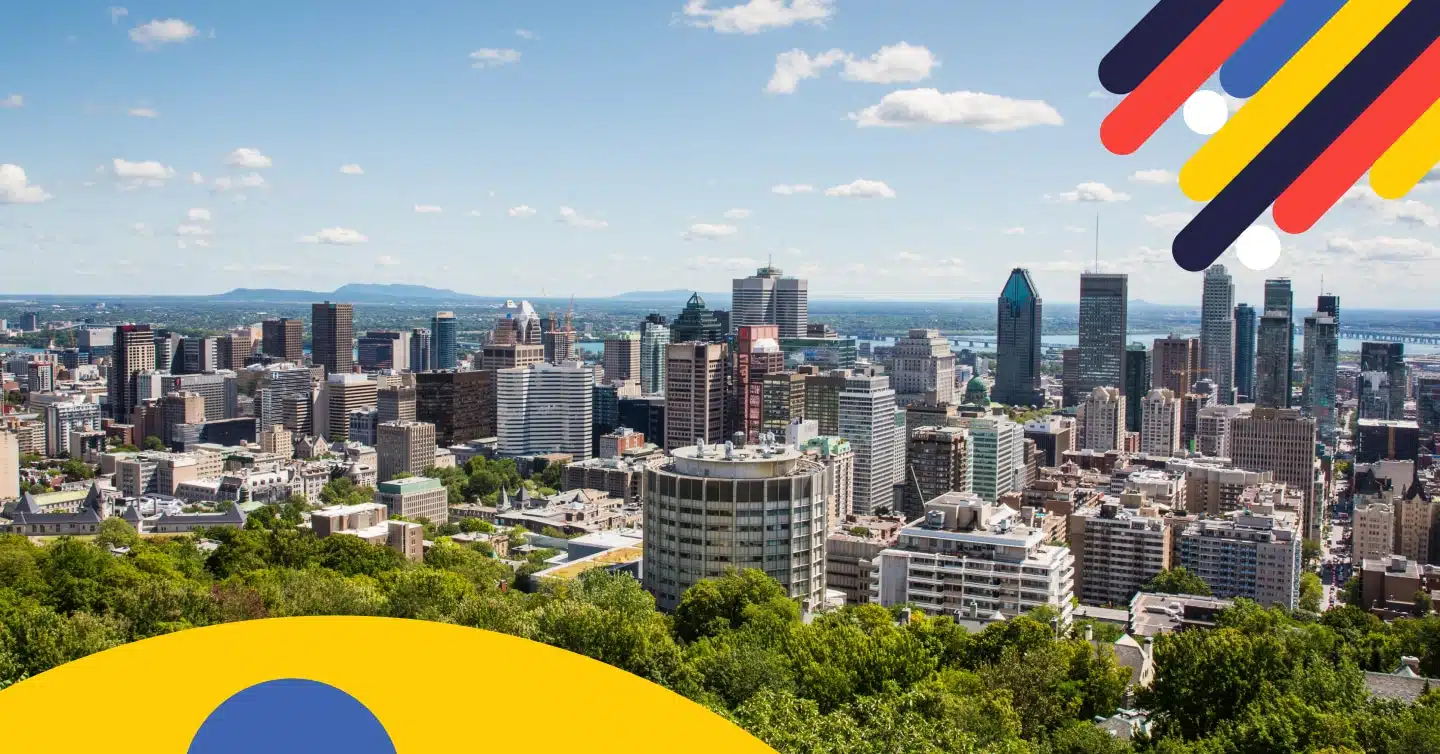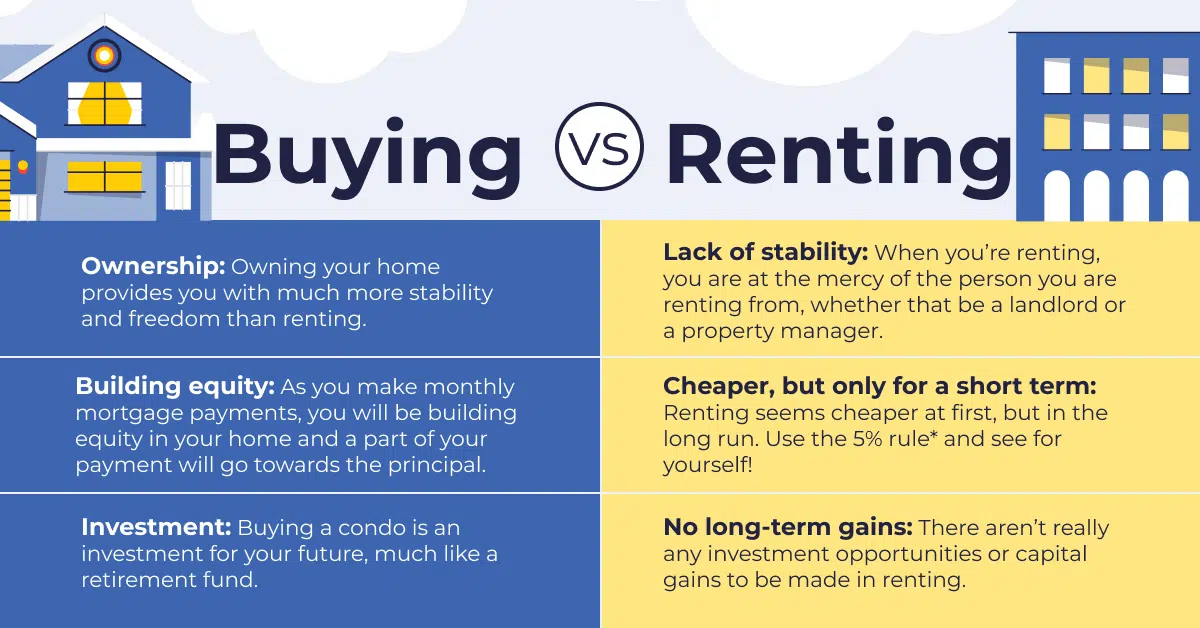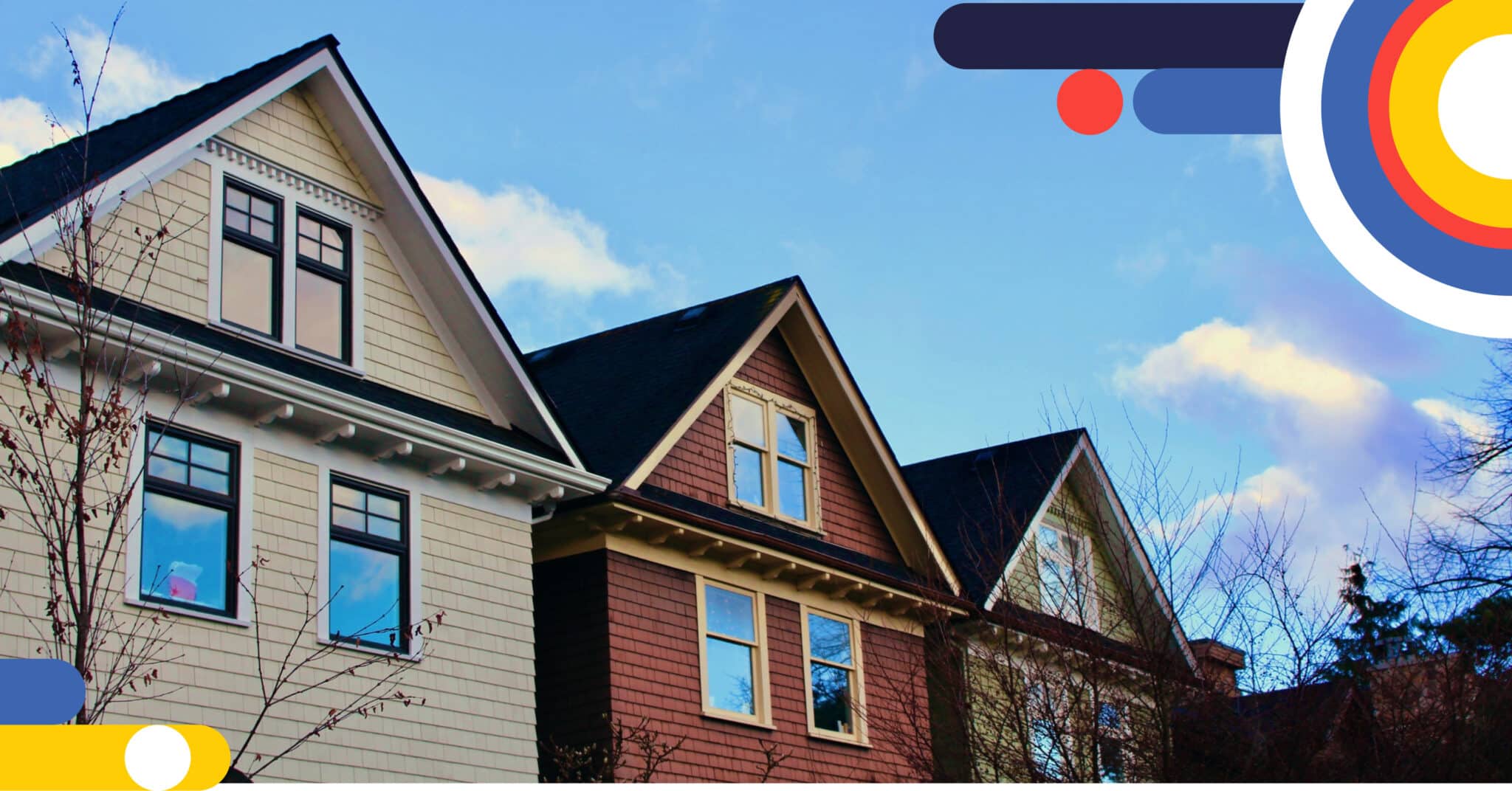Real Estate #Featured articles
Real Estate #Featured articles
Is It Better to Buy or Rent in Montreal?

Table of contents
Deciding whether to buy or rent a home in Montréal largely depends on your situation, preferences, and financial goals. Montreal’s housing market is more affordable than that of other major cities in Canada. Renting is an excellent option for those who crave flexibility or want lower upfront costs. Homeownership may be better suited for those who want stability, the chance to build equity and potential long-term gains.
To determine the best path for you, weigh the pros and cons of each option, considering your finances, lifestyle, and the current state of the housing market.
Key Takeaways
- Renting provides flexibility and lower upfront costs.
- Buying offers stability and potential long-term gains.
- The 5% rule can help determine if renting or buying is more financially advantageous by comparing costs.
Renting a Home
Renting a home can be more convenient and appealing to some because of its flexibility and lower upfront costs. However, the lack of stability and long-term financial gains may be deal-breakers for others. Let’s examine the pros and cons of renting a home.
Pros of Renting
Flexibility
If you prefer to move around or don’t want to stay in the same area for longer than a year, renting can give you the flexibility to move. Leases are shorter-term commitments of usually no more than a year, allowing you to choose somewhere new without locking you into a specific neighbourhood, suburb or city.
Maintenance
As a renter, you are not responsible for property maintenance. This responsibility is solely your landlord’s or property manager’s, which can save you time and money if something needs to be repaired. Your landlord or property manager will arrange repairs and cover the expense if something goes wrong while renting.
Save Money
Renting in the short term is much cheaper than owning a home. You only require the first month’s rent, which is significantly cheaper than the large upfront down payment required to purchase a home. Even if you can afford to purchase, it may not always be the investment you want to make. Renting can allow you to diversify your investments or keep them more liquid than investing in real estate.
Cons of Renting
Lack of Stability
When renting, you have either a landlord or property manager who dictates what you can do with your space. You may not be allowed to make alterations like painting or improvements without approval. Since you don’t own the space, you could be forced to move before you want to if your landlord issues an eviction. Luckily, Montreal has better protections for tenants than other major cities, making it harder for landlords to evict.
Rental Increases
Rent typically increases yearly, which can easily make renting unaffordable if it increases significantly. Since Quebec doesn’t have rent caps tied to inflation like some provinces, knowing how much your rent will increase yearly can be unpredictable. As long as it’s considered reasonable if disputed, your landlord can increase the rent by as much as they wish.
No Long-term Gains
Renting doesn’t provide investment opportunities or provide capital gains. While renting can be more affordable initially, there are no long-term returns. Over time, renting becomes more expensive than owning unless you can commit to investing your money in a way that produces returns similar to real estate appreciation.
Owning a Home
Homeownership can be more appealing for some for its stability, while others find the lack of flexibility and potential costs to be deal-breakers. Let’s examine the pros and cons of owning a home.
Pros of Owning
Stability
Owning a home provides stability since you don’t risk being priced out of your home. You are also free to make alterations and improvements to the space, making it your own without anyone’s approval. Since a mortgage typically has longer terms than renting, there is more payment stability, especially if you choose a fixed rate. You’ll know exactly how much you will pay over your mortgage term with a fixed rate, so you won’t need to worry about payments increasing as they are likely to with rent each year.
Building Equity
As you pay your mortgage down, you build equity in your home. As you continue making mortgage payments and have enough equity, you can refinance later to access it for other significant expenses like renovations, paying for education, consolidating debts, or meeting other financial goals.
Long-term Gains
If you choose to sell your home, chances are it’s increased in value since you purchased it. When you sell, you realize a capital gain by selling for a higher price than you paid. Since Canada has a principal residence exemption, this eliminates the capital gains tax you would pay when selling a primary residence. Not including property taxes you pay as a homeowner, this exemption essentially makes your home a tax-free investment as long as it remains your primary residence for the entire time you own the property.
Cons of Owning
Less Flexibility
Buying may not be ideal if you only want to live somewhere for a short period of time. Due to the high upfront costs of homeownership, buying is a long-term commitment. It’s also much harder and more costly to get out of a mortgage and sell than to end a lease.
Maintenance Costs
Homeownership comes with additional costs to maintain the home over time. You may be required to cover anything from minor repairs and general upkeep to significant repairs like replacing a roof, windows, or appliances. In addition to ongoing maintenance costs, you have other costs like property taxes and homeownership insurance to budget each month.
Down Payment, Closing Costs and Mortgage Payments
Buying requires significantly more money upfront compared to renting. Your down payment depends on the purchase price and is at least 5% up to 20% or more. You’ll also need extra set aside for closing costs, which are due upon closing and can add up to 4% of the purchase price to what you need upfront for homeownership. Depending on your mortgage type and interest rates, your mortgage payments could increase considerably if rates change. Rent typically increases once a year, giving you time to adjust your budget. However, if you own and have an adjustable-rate mortgage (ARM), your mortgage payments could fluctuate up to 8 times a year, with changes to the Bank of Canada policy rate giving you little time to budget for increasing payments.
Buying could be the best option for you–
Download our full report below to find out!
Rent vs Buy: Using the 5% Rule
If you’re unsure if renting or buying is the best option, use the 5% rule to more accurately compare options. The 5% rule compares renting to buying using unrecoverable costs, helping you determine which makes the most sense. Unrecoverable costs are expenses that don’t generate a return or build equity.
Here’s how unrecoverable costs differ for renters and homeowners:
Rent: Rent payments are 100% unrecoverable. You pay for a place to live but don’t build equity or receive any financial return.
Homeownership: While part of your mortgage payment goes toward building equity, certain costs of homeownership are unrecoverable. These include:
- Property Taxes: Estimated at 1% of the home’s value annually.
- Maintenance Costs: Also estimated at 1% of the home’s value annually.
- Capital Costs: Estimated at 3% of the home’s value annually, representing the opportunity cost of investing elsewhere versus owning property.
Together, these costs total 5% of the home’s value, which is the basis of the 5% rule.
How the 5% Rule Works
The 5% rule is an oversimplified calculation comparing renting vs buying by calculating the unrecoverable costs of homeownership. You can calculate unrecoverable homeownership costs by doing the following:
- Multiply the home’s value by 5% to find the annual unrecoverable cost.
- Divide that number by 12 to get the monthly equivalent.
- Compare this figure to the cost of renting a similar property.
If renting is less than the calculated monthly unrecoverable cost of homeownership, renting might be the better option.
Example:
- Home Value: $450,000
- 5% of Value: $22,500
- Monthly Cost: $22,500 ÷ 12 = $1,875
Based on this example, if you can rent a comparable home for less than $1,875 per month, renting might make more financial sense.

Rent vs Buy: Montreal Example
Let’s use the 5% rule to compare Montreal’s real estate and rental markets.
Average Monthly Rent: $1,986
Average Condo Price: $420,000
- Annual Unrecoverable Costs of Ownership: $420,000 × 5% = $21,000
- Monthly Cost: $21,000 / 12 = $1,750
If you can rent a comparable property for less than $1,750 per month, renting may be the better choice. In this case, the average rent of $1,986 is higher than the calculated monthly unrecoverable homeownership costs, suggesting that homeownership could be the more economical option. However, renting might be better if you find an equivalent property with a monthly rent of $1,750 or less.
Frequently Asked Questions
Is it better to rent or buy in Montreal?
This answer depends on your preferences and goals. If you prefer the flexibility to move around or don’t have a significant sum saved for a down payment, renting could be the better option. If you plan to stay in one area for multiple years, want stability and have a down payment ready, buying could be the best option.
How much do I need to buy a house in Montreal?
The minimum down payment is 5% of the purchase price for properties under $500,000 and 10% on the remaining amount up to $1,4999,999. However, you’ll also need to budget and consider additional upfront costs like closing costs. You’ll also need to include mortgage default insurance unless you plan to put down 20% of the purchase price.
What are some of the hidden costs of buying a home in Montreal?
While there are no hidden costs associated with buying a home in Montreal, you’ll need to account for closing costs like land transfer tax (welcome tax), legal fees, and home inspection), which could add up to 4% of the price of the property you require upfront. You’ll also need to account for property taxes, homeowner’s insurance, condo fees (if applicable), potential maintenance and repairs, and your down payment and mortgage costs.
Final Thoughts
Buying or renting will depend on your preferences, finances, and goals. If you have a long-term outlook of 5-10 years, buying a home remains the more financially sound option, allowing you to build equity as you make mortgage payments. However, renting may be a better fit for your lifestyle if you have a short-term outlook of less than 5 years. This allows you the flexibility to relocate, invest, and save for a down payment if you plan to purchase in the future.
Are you ready to become a homeowner in Montreal? Contact a nesto mortgage expert today to find the best mortgage solution for your needs.
Find a better rate, and we’ll match it, beat it, or give you $500*.
*Conditions Apply
With nesto, it’s stress-free
Ready to get started?
In just a few clicks, you can see our current rates. Then apply for your mortgage online in minutes!















